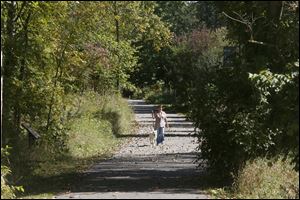
River Trail routes near hospital get considered
Issues include privacy for hospice and costs
1/27/2014
Chris Bowes of Ottowa Lake, Mich., walks her dog, Artie, an 11-year-old Pitt mix, along the River Trail in Harroun Park in Sylvania. Preliminary design costs for two alternative River Trail routes along the ProMedica Flower Hospital campus would tack more than $1 million dollars onto the original construction cost.
Preliminary design costs for two alternative River Trail routes along the ProMedica Flower Hospital campus would tack more than $1 million dollars onto the original construction cost.
Kevin Aller, Sylvania service director, recently presented council members with the results of SmithGroup JJR’s design work for Phase Two of the trail.
Alternative A mainly courses through floodplain area, and requires about 1,300 elevated feet of walkway so as not to disturb the mushy ground below. The total design and construction cost is estimated at $2.88 million.
RELATED CONTENT: 2 proposed River Trail options at Flower Hospital campus
Alternative B would cross over the Ottawa River further east and require less elevated walkway — 1,100 feet — lowering the cost to $2.65 million.
Officials were going to map a third route that looped south around the campus. Mr. Aller said it was not researched.
“The aim of the trail was to provide a view of the river, have a nature walk if you will, so it is not being considered,” he said.
A first phase of the trail completed in 2012 runs along Ten Mile Creek between Main Street and Harroun Road. Two additional phases would extend the trail west to Silica Drive and, more importantly to Flower Hospital, east from Harroun across hospital property near the Ottawa River and onto Monroe Street east of U.S. 23. Phase One completed in 2012, cost $1.3 million, paid mostly by grants.
A conceptual plan prepared for the city four years ago by JJR of Ann Arbor, shows the trail south of the river, close to campus buildings — a route hospital officials say could invade the privacy of hospice-care patients and their families. That extension was estimated to cost $1.46 million.
The original trail would bring runners and bikers close and in open view to the Ebeid Hospice Residence. The facility is built with large windows and outdoor patios so terminally ill patients can enjoy a peaceful natural atmosphere. The alternative extensions presented in the recent plans include a thicket of woods that would screen walkers from a hospice resident’s view.
Last week, hospital officials received the preliminary design drawings of the two alternative routes. Timothy Langhorst, ProMedica vice president of communications, said the hospital is willing to work with city officials on the project, and would assist in seeking grant funds for it.
“Wherever it winds up going our first obligation is to the patients and the families,” he said, adding that the city’s first option was not considered, feeling it infringed on patient privacy. Hospital officials have said they would donate the land to the project, and the hospital would split the cost of preliminary design work with the city, which is estimated at $17,000.
Mr. Aller indicated that the city’s preference is the original route. He noted the gap between the original cost and the cost of the two alternatives. At a council meeting Tuesday, members seemed to prefer route B. Concerns over funding were raised.
Mr. Aller said it has a $200,000 grant from the Transportation Improvement Program, through the Ohio Department of Transportation, and that it would apply for Clean Ohio Trails. It received about $500,000 of Clean Ohio Trails’ funds for phase one.